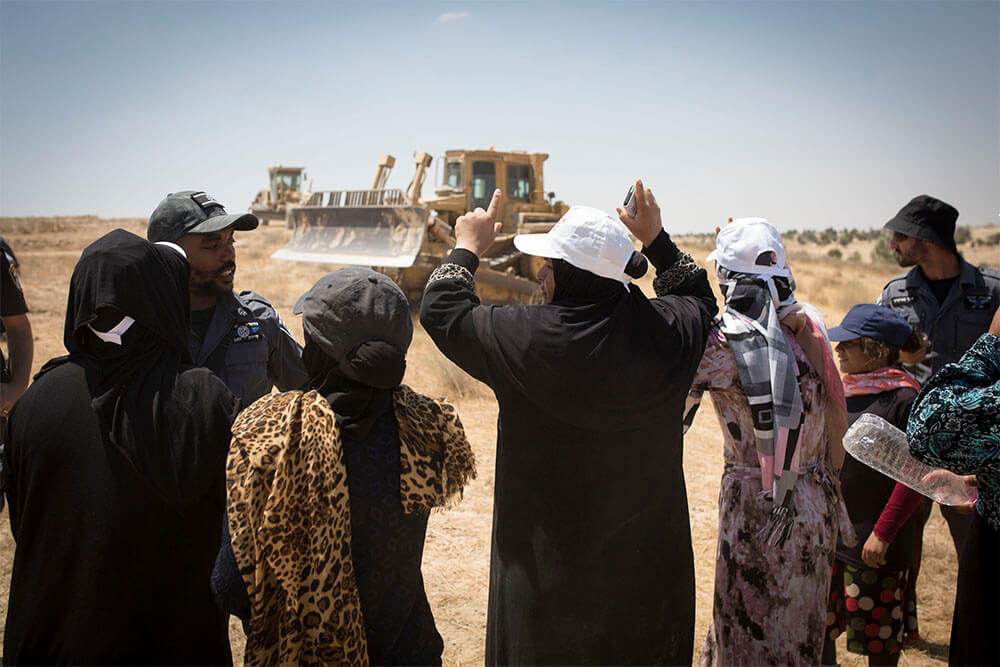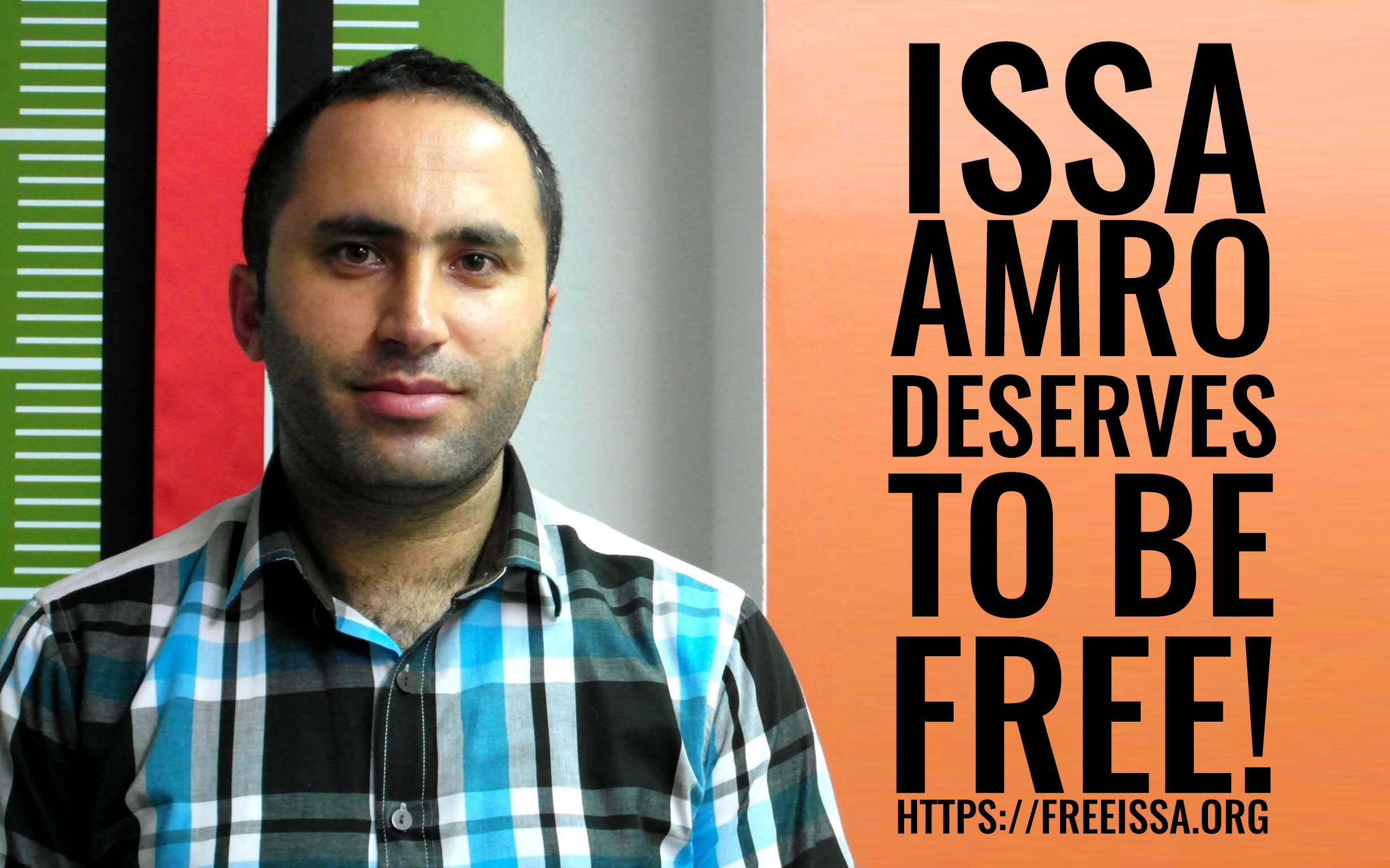“A steadily shrinking space” for Israeli and Palestinian HRDs
HRDF Update, Spring 2017
Heightened Threats: Criminal and Civil Legal Harassment of Bedouin Communities in the Negev
Three new indictments were presented recently against activists, community leaders and residents of the Bedouin village of Al-Arakib. .HRDF defends about dozen residents of the village, including one minor and one elder, together with activists from the Negev Coexistence forum, who are indicted with several criminal charges following their peaceful efforts to prevent JNF tractors from encroaching further on to their land on July 2016. A great amount of civil and criminal proceedings were opened in the last few years against the head of the community – Sheikh Sayah, his close family members, and dozens of community members over their protest activities (on top of legal battle for land ownership).All trials are going on this year in Israeli court.
It is clear that legal persecution is being used strategically as a tool breaking non-violent resistance of human rights defenders in al-Arakib.

—
Geographical Focus: Targeted Human Rights Defenders groups in the Jordan Valley
The Palestinian communities of the Jordan Valley are small farmers communities, who are particularly isolated from the rest of the West Bank. Over the past few months there has been an increase in harassment, both by Israeli military and by Jewish settlers, and residents face various threats, from confiscation of agricultural equipment and vehicles to obstruction of work by preventing them from farming – both physically, and through the use of ‘closed military zone’ orders.
These forms of harassment are meant to force residents to evacuate their lands, while they refuse to surrender and bravely insist to hold their lands.
In the last few months, HRDF has provided support to Israeli and Palestinian Human Rights Defenders, facing various legal threats after accompanying Palestinian shepherds, documenting land confiscations and growing settlers’ violence, and peacefully protesting against human rights violations in the area.
HRDF-funded lawyers represented activists who were arrested, detained, and/ released with limiting conditions – including one activist who was re-arrested for allegedly violating them. In one case, a restraining order was presented after a settler complained on alleged harassment. The settler withdrew the complaint before any discussion took place.
In another incident, the police showed up in the middle of night at the private residence of a Ta’ayush activist, soon after he had called them to report settlers’ harassment of Palestinian shepherds. This incident was reported in Israeli media.
HRDF recognizes the trust grassroots activists have earned from the Palestinians in the Jordan Valley, the critical role they play in opposing the occupation, and that they are frequently and systematically targeted by authorities. Therefore, HRDF is committed to providing activists with long-term support against arrests and indictments, which is crucial in allowing them to continue their work.
—
Emerging Threats: Israeli government attempts to deter political resistance
A recent amendment to the Entry to Israel Law (passed last month) denies entrance to Israel from foreign nationals who publicly call for boycott of Israel or the lands occupied by Israel (i.e, boycott of the settlements alone) or has committed to participate in such a boycott. The amendment joins a a tide of anti-democratic legislative proposals passed by the Israeli Parliament in the last few years, meant to shut criticizing voices. Although a sovereign state has a broad discretion to determine its immigration policies and laws, this amendment contravenes basic principles of democracy and international law. The law, both explicitly and implicitly, discriminates on the basis of one’s political and moral convictions and it further violates freedom of speech and freedom of conscience.
Earlier this year, Public Security and Strategic Affairs Minister and Interior Minister announced their intent to form a “task force” that would seek to identify, track and deport activists who supported a boycott, as well as prevent their entry into the country. At the same time, those Ministries were trying to compile a database of Israeli citizens who support BDS.
—
Update on Ongoing Legal Cases: Issa Amro faces an 18-charge indictment
Recently, at Ofer military court, the court read the full indictment and HRDF-funded defense lawyer, Adv. Nery Ramati of the Gaby Lasky law office, gave a short statement. The trial will proceed to the evidence part (next hearing is on July 4th). See full analysis of the court’s answer to the defense’s request to annulling the old charges from the indictment.
—
Advocacy: UN Special Rapporteur On The Situation Of Human Rights In The Palestinian Territories delivers a special report on HRDs, citing an HRDF report and analysis
Mr. Michael Lynk (Canada) as the seventh Special Rapporteur on the situation of human rights in the Palestinian territories occupied since 1967 delivered a special report on the situation of HRDs to the UN Human Rights Council. This report is based primarily on written submissions as well as consultations with civil society representatives, including HRDF. The SR expresses concerns since “Human Rights Defenders in Palestine and Israel who investigate the grave human rights situation in the Occupied Palestinian Territory are facing a steadily shrinking space for their indispensable work.” The SR highlights a few prominent cases legally represented by HRDF-funded lawyers.
—
Important Legal Precedence: In First, Israeli Military Court Throws Out Palestinian Boy’s Interrogation
Lawyer Nery Ramati, of the Gabi Lasky law office is one of HRDF network of lawyers. As part of his struggle for defending Palestinian rights in the military court, which often operates in a manner that does not allow fair trial or due process.. Ramati had reached an important achievement in the protection of minors, when last month, Israeli military court has made a precedential ruling by refusing to admit a Palestinian minor’s statements to the police, because he had been denied access to an attorney during interrogation. The case in question was not funded by HRDF.
The ruling could have far-reaching ramifications. Hundreds of minors from the west bank and East Jerusalem are arrested each year, usually on suspicion of throwing stones. Almost all of them are interrogated without the presence of a parent or an advice of an attorney.


